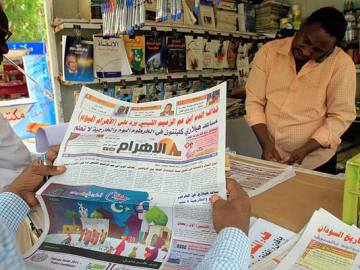Print media in Sudan facing serious challenges
September 9, 2013 (KHARTOUM) – Newspapers in Sudan are facing a major crisis due to the sharp decline in selling rates and heavy government censorship controls.

In a country inhabited by 33 million people, various types of newspapers including political, sports and arts sell a combined total of less than 500,000 copies daily.
More than 30 sports and political newspapers are published every day in Sudan’s capital, Khartoum; however, their reach remains limited and does not extend to the peripheral regions of the country due to poor infrastructure and the lack of effective distribution companies.
Furthermore, the government imposes high fees on printing and imported paper, with significant efforts exerted by publishers over the years failing to convince authorities to reduce the fees.
Sudanese authorities routinely confiscate newspapers which publish material critical of the government, army, police or security forces. Several newspapers have suffered heavy financial losses during 2013 due to repeated suspension and confiscation.
The majority of journalists in Sudan suffer from harsh living conditions due to high inflation rates and low monthly salaries of less than $100, as well as facing continuous harassment from authorities when reporting on issues of a sensitive nature.
“I earn a monthly salary of less than $120 which doesn’t suffice for a daily single meal; however, I am forced to continue working until we see a radical political and economic change”, one journalist, who spoke on condition of anonymity, said.
“We come here to do away with our worries, eat breakfast and drink tea and coffee, newspapers have become repellent and they are controlled by opportunists who are cajoling authorities to serve their own personal interests”, he added.
Earlier this year, the government acquired major shares in two independent newspapers, Al-Sahafa and Al-Khartoum following repeated harassment which forced their publishers to sell off a significant amount of their shares, leading the anti-government Sudanese journalists’ network to describe the move as the “marriage of the fourth estate to the executive power”.
The strict control mean it has become increasingly difficult for newspapers to publish news articles and reports which criticise the political and economic situation in the country as chief editors continue to heavily exercise self-censorship in order to avoid confiscation and suspension.
The editor-in-chief of one independent newspaper said that recovery of the print newspaper industry from its “terrible deterioration” is conditional upon political change which brings about a democratic government that respects press freedom.
The manager of a newspapers ads office said that distribution has fallen below 50% due to price increases, pointing out that some newspapers which used to sell 55,000 copies are currently only selling 30,000.
(ST)
